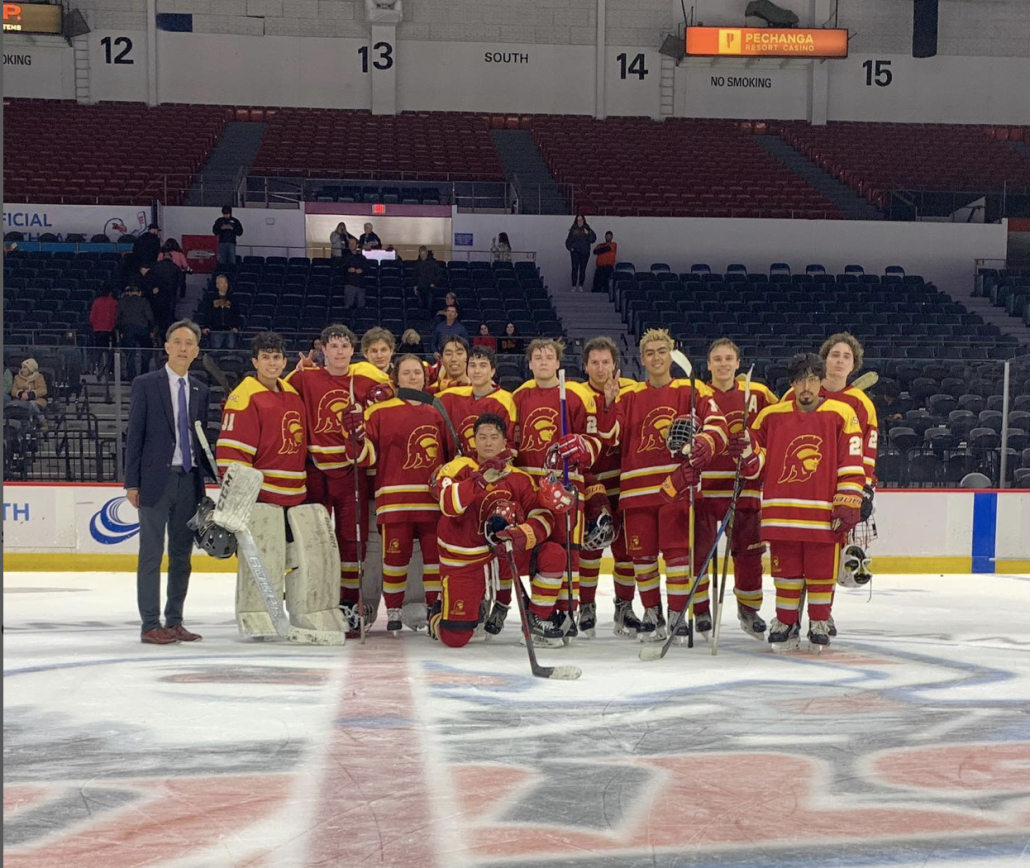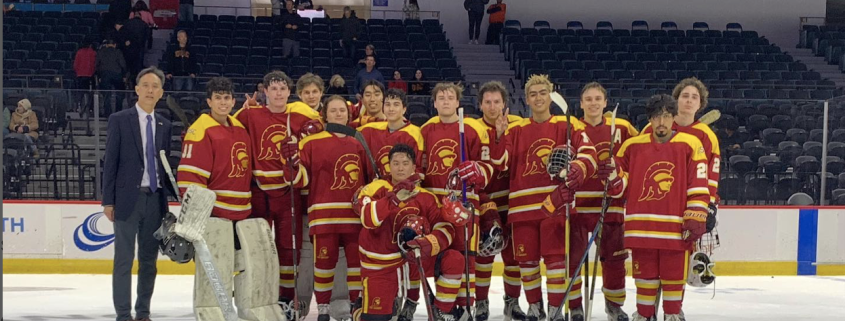How USC’s Club Ice Hockey Team found TikTok fame

It only takes one TikTok to go viral — one goofy trend, one catchy song, one funny joke.
Sometimes, though, it’s outside-the-box content that best finds social media success; something so specific that the algorithm catches its creativity and specificity and delivers it to the exact users who will love it.
That’s exactly what happened to USC’s Men’s Ice Hockey club team, whose TikTok account has accumulated about 12,800 followers and over 717,000 likes. This was mostly thanks to a quirky video where the players, in uniform and on the ice, pretend to read hockey romance novels by the best-selling Canadian author Elle Kennedy.
The guys on the team found the idea a little embarrassing and worried that if other teams found the video they’d be ridiculed.
“They can’t embarrass you if this gets a million views,” Chloe Higgins, one of the team’s two TikTok managers, told them.
The video gained a few more than just a million views. To date, it has over 2.9 million and well over 5,000 comments. For perspective, only one post from the official USC Athletics account has received more views than the BookTok post.
The idea came from Higgins, a junior majoring in American Pop Culture. A few years ago, she started reading Kennedy’s hockey romance novels, making her want to go to a hockey game. Instead of seeking out Los Angeles Kings tickets, Higgins investigated the club’s Instagram and found the TikTok account Issac Magallanes Sr., a junior majoring in electrical and computer engineering, had started for the team.
Higgins knew she could improve the account, so she reached out and offered her help. She roped in Anna Lokken, a sophomore majoring in Theatre (Acting), as her production partner and the two got to work. Lokken typically films the content, then Higgins edits and posts it, managing the analytics and general strategy.
With the book TikTok, Higgins specifically wanted to target a female audience.
“Why aren’t we marketing towards women?” Higgins asked herself. “Women love sports just as much as men, if not more … people need to be marketing towards women. So, when I took over the account, my whole thing was like, ‘what do I want to see from an account, what do I think is funny?’”
As a fan of Kennedy’s books, Higgins knew she had an idea that would work. And Higgins and Lokken are not just one-hit wonders; Two other videos have over 480,000 views, and all but one of their posts has over 10,000.
But to understand why a social media presence has become so important to the team, one has to look back a couple of years to the coronavirus pandemic.
After a forced hiatus for the 2020-21 season, when USC did not have any in-person activities on campus, the club had just one returning player for 2021-22. Jacob “Jake” Abene, the former club president and captain of the team, built the club back up from nothing during the 2021-22 academic year. After a challenging first year back, Abene passed the club leadership on to current co-presidents graduate student Chris Chow and Declan Driscoll.
Driscoll, a junior majoring in biological sciences and economics and the team’s alternate captain, was one of the first members of the club’s new iteration and has helped carry on Abene’s rebuilding work.
“[Abene] was kind of a role model for us,” Driscoll said. “[Trying] to rebuild the traditions, try[ing] to create our new traditions … I think that year, that very first year back, we only had 15 skaters including him, and so we had to build this club back from the ground up physically … and culturally, in terms of establishing traditions and figuring out how to operate the team.”
Running a club team has no shortage of challenges. For one, having full attendance for games can be a struggle, as players try to balance school and team commitments without the administrative support that the University has in place for varsity student-athletes. Driscoll and Chow do their best to schedule around the chaos, but even then not everyone can make it week-to-week.
“[I]t’s not always easy to be able to commit the time to even once-a-week practice and twice-a-weekend games,” Driscoll said. “We try to limit our travel to once a month, we don’t play hockey games on the same weekend as a home football game to try to increase opportunity or availability for players … we take midterm seasons into account, so we try not to schedule travel in and around midterm seasons.”
Even when they work around conflicts in the schedule, there’s no guarantee that everyone shows up. At the team’s American Collegiate Hockey Association Division 2 Pac-8 playoff game against the University of Utah in Spokane, Washington, the team was not able to bring their deepest squad. Due to midterms and injuries, the Trojans were left short-benched against a well-stocked Utes team and the Trojans lost in the first round.
To win in hockey, a sport known for its on-the-fly substitutions and rapid shifts, you need a deep team so that everyone stays fresh. A full roster is crucial to success, so a team needs to continue to attract players and establish a physical — and, especially these days, online — presence.
That’s where Magallanes stepped up. Magallanes effectively stumbled into his role as the de facto head of social media. The executive board was having a meeting at the team’s end-of-year banquet when Issac walked past and Chow semi-jokingly asked him if he wanted to be the social chair.
“I just kind of rolled with it,” Magallanes said. “I got the social media accounts from our then-captain Jake Abene … and started looking at other hockey accounts, like [the University of Michigan] and [the University of Washington], and I was just seeing what works for them.”
Magallanes thought he was up to the challenge and started developing graphics templates for the team’s Instagram and broadcast livestream. He even made a few TikToks himself before Higgins reached out to him, offering her help. When Higgins and Lokken proposed the famous BookTok video, Magallanes remembered being skeptical.
“I remember looking at it the first time and thinking, ‘I don’t get it,’” Magallanes laughed in hindsight. “But obviously they knew what they were doing.” The book’s author even reached out to the team after discovering the video, who reposted it on her social media and retroactively paid the team for promoting her books.
The enhanced Instagram presence has already paid dividends. When junior Miles Salzgeber knew he was transferring to USC, one of the first things he did was find the team’s account and used it to reach out to Magallanes. Now, Salzgeber has become a dedicated member of the squad.
When it comes to the team’s social media success, Higgins appreciates that not only does it benefit the team, but it’s helped her on her career path as well.
“As much as we help them, I think that they definitely [help] us. At least for me, I had no sports social media [experience] and that was the job that I wanted to do. So they really helped me hone my skills and be able to put something on my resume,” Higgins said. “It’s symbiotic.”
The hockey team is proving that the function of club sports is not just to help athletes continue playing at a high level, but to give members burgeoning opportunities to build a grassroots following that brings communities together, both in-person and beyond.
Above all, the most important thing to Driscoll is that the team keeps playing, so he wants to be sure he leaves the club in good hands.
“I try to remind myself of that a lot, just trying to leave the team better than I found it, and I think social media is a great way to do it.”
Now, the club has an eight-member broadcast team to stream their games. Even more crucially, Salzgeber believes that the club has done the hard work of self-discovery and will hit the ground running next season.
“I think it’s just a matter of finding our identity as a team and as a program, and I think that we definitely found that this year. So I think going into next year, we know what that is, we identified that and we can just keep the ball rolling,” Salzgeber said.
“We’ve got nothing but good times ahead.”

